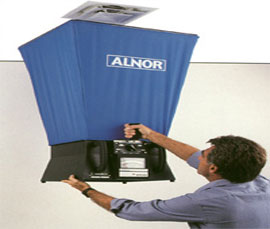


Most of today's newest HVAC systems are being designed with many more individually controlled temperature zones to improve occupant comfort. Variable speed fans and pumps are becoming more commonplace to provide the exact amount of heating and cooling system capacity in a manner that minimizes overall energy usage. New occupant air ventilation codes are much more restrictive and at the same time building envelopes are becoming much tighter. The combination of constantly changing HVAC airflow rates and increased demand for fresh- and filtered-ventilation air for all occupants is placing more emphasis on fine tuning HVAC system operation.
The following tips are included for initial planning.
Pre-planning for TAB work includes making certain that all the necessary parties and individuals to conduct the work are onboard. The type of building and systems to be tested and a realistic evaluation of what skills the TAB technician possesses are key planning elements.
Often, a controls specialist will be needed to operate the system for the TAB technician.
The representatives from the original equipment suppliers may be needed as a resource, at a minimum, but for complex equipment and systems or in a new building startup a manufacturer's representative may be required at the site to operate the mechanical equipment.
In chiller systems, pumps, pipes… and terminal units are selected to meet a specific maximum cooling load. If this capacity cannot be obtained because the system is unbalanced, then the owner has not the full return on his investment.
If the supply water flow is correct, any zone flow greater than its design will create less flow available to other zones. This results in remote circuits with less than design flow which are not able to meet their required load.
If the building has a facilities manager that individual is typically the most important participant with which the on-site TAB technicians will work. Facility managers have a substantial vested interest in ongoing customer satisfaction—the people who work or live in the building are actual end-use customers—and their satisfaction will ultimately be the key measure of success.
Occasionally, a system cannot be balanced or made to perform in accordance with the contract's design specifications regardless of the number of balancing dampers or valves that can be installed. Competent TAB technicians should be prepared for this possibility and work with the appropriate individuals to formulate recommendations as part of the final TAB report.
It should be made clear that the TAB work is not "commissioning." Most commissioning services are completed by firms having technicians experienced with each of the individual building systems—HVAC, lighting, plumbing, electrical, and security systems.
TAB Technician
TAB technician designates the person in charge of the TAB work being done on the HVAC system. TAB procedures on a complicated HVAC system require that the TAB technician must be a well-trained, highly-skilled, and knowledgeable individual. This person must know the fundamentals of airflow, hydronic flow, refrigeration, and electricity and be familiar with all types of HVAC temperature controls and refrigeration systems. They must also know how to take pressure, temperature, and flow measurements and be able to perform effective troubleshooting.
TAB Team
There are TAB jobs that can be done by one person.
However, many HVAC systems need a TAB team to
complete the TAB work efficiently and in a reasonable time period. It is equally important that the other members of the TAB team be trained and knowledgeable in the basic fundamentals and procedures of TAB work.